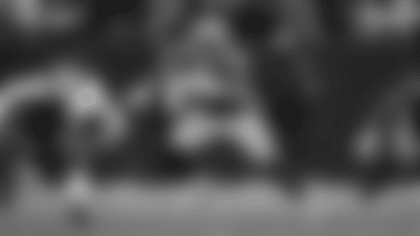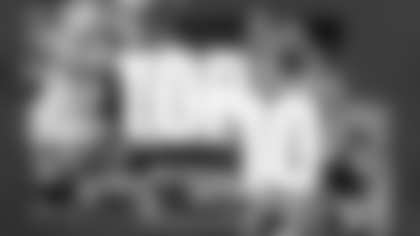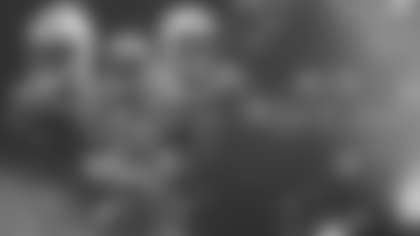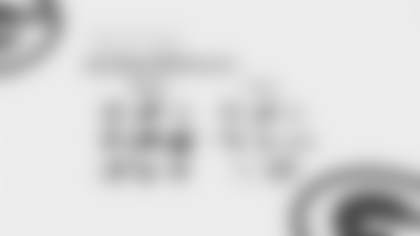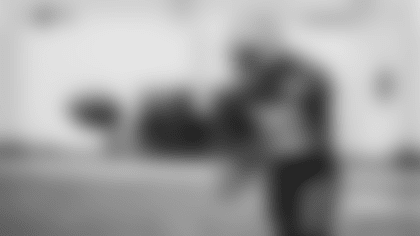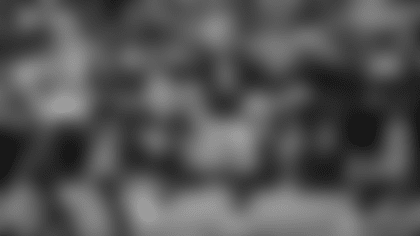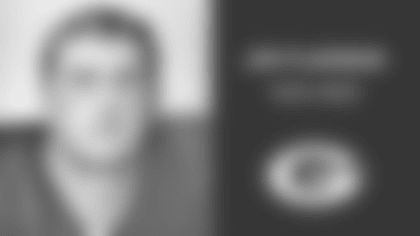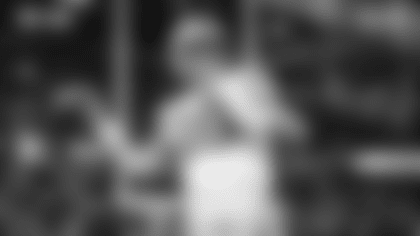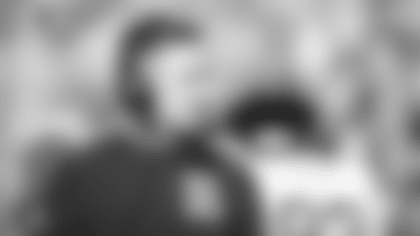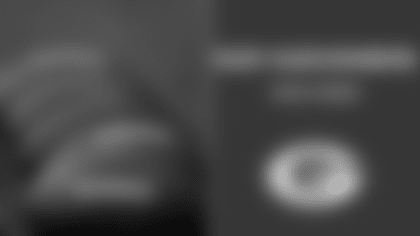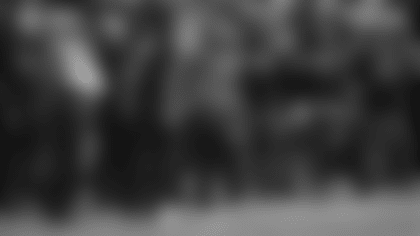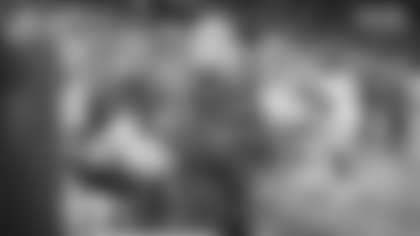Cliff Christl started gathering oral histories with former Packers and others associated with the team in 2000 and will continue to gather them as Packers historian. Excerpts from those interviews will be periodically posted at www.packers.com
Dave Hanner played defensive tackle for the Packers from 1952 through 1964 and spent 43 years in all with the team. Hanner's 13-year playing career is tied for the sixth longest in club history. He was named to the Pro Bowl in 1953 and '54 and started on Vince Lombardi's first two championship teams in Green Bay. Hanner was inducted into the Packers Hall of Fame in 1974. Following his playing career, he also served as an assistant coach for the Packers from 1965-79 and again in 1982, and then served as a scout from 1983-96. This oral history covers Hanner's years as a player.
On what it was like playing in Green Bay in the 1950s: "You trained at the baseball park by East High. In the locker rooms, you could see beer cans down underneath because the cracks were so wide in the showers. It was cold as (blank) in the wintertime. You'd get in the whirlpool to get warm again. But people were still good to you. People knew a lot about football. You'd stay at the YMCA where you could eat for a dollar. I guess you couldn't afford much more than that. I lived with Bobby (Dillon) the first two years at the Y."
On the routine and atmosphere before Vince Lombardi became coach: "You wonder how anybody won games back in those days. You had one meeting a week. You looked at film on Monday or Tuesday. They put the game plan in on Wednesday and you wouldn't meet (again) until the day before the game. You'd look at one film, two at the most. The only time you had curfew was the night before the game. But the whole league was kind of like that: Undisciplined. I guess Paul Brown (coach of the Cleveland Browns) was the most disciplined coach at that time. At least, he had people wearing ties on trips and rules like that. Everybody else was loosey-goosey."
On whether players would be out drinking and carousing every night: "You may go have a beer, but there wasn't much of it. Nobody had the transportation. There wasn't half (the players that) had cars. Even going for lunch, you'd find somebody with a car and go out to the Shrimp Shack along the river between Green Bay and De Pere. Practice wasn't very long: An hour-and-half, two hours maybe. But you ran wind sprints most of that time. You'd go shoot pool and you never did miss a movie. Bill Forester came in about that time, and he and Dillon and I ran around quite a bit. Sometimes, we'd go eat at Chili John's."
On playing at old City Stadium from 1952-56: "The young kids would go into the game with us before the game. When we'd leave the locker room and go into the stadium, they'd get in line with us and go in. We'd always have a bunch of kids with us. (Heck), back then, nobody bothered with it. The kids would just run around anyway."
On Gene Ronzani, his first head coach in 1952 and for 10 games in 1953: "The best thing I can say is that I liked him, but I didn't know any difference."
On Ronzani traveling to the West Coast on the same train as the players just days after he had been fired as coach following a Thanksgiving Day loss to Detroit in 1953: "I think he bought me a beer out there. He stayed at the same hotel we did in San Francisco. Scooter (McLean) and Hugh Devore took over."
On having Devore and McLean as interim coaches for the final two games in '53: "It wasn't a very good situation. You look at it now and you understand why it was tough to win. Devore was hollering when you were running sprints – from the time you left until the time you finished. Nobody paid attention to him. He was one of those coaches who hollered all the time. And after you hear so much, nobody pays attention."
On 35-year old, 11-year veteran defensive lineman Ray Bray, a Caspian, Mich., native obtained by Ronzani before the 1952 season after playing 10 years with the Chicago Bears: "He was the toughest guy I've ever seen. He'd play that center nose, and he was kind of over the hill. He'd play a game, both knees would swell big as a balloon and he wouldn't practice for several days. Come game time, he'd beat the (heck) out of that center. He was so strong and tough."
On lineman Dick Afflis, who played for the Packers from 1951-54 and then gained greater fame as Dick The Bruiser, a pro wrestler: "He played some, but he couldn't touch his hands over his head he was so muscle-bound. He was top heavy. He wore a size 32 pants and a 54, 55 coat. He was strong. He could do a one-handed push-up. But he couldn't play. He couldn't change direction."
On Lisle Blackbourn, the Packers head coach from 1954-57: "I thought he did a good job that first year. Then the second year, I remember Lou Rymkus (the line coach) went up and put plays on the board the first or second night, and (Blackbourn) went up and took the chalk away from him and told him, 'That wasn't right. That's not the way the play goes.' Then, (Blackbourn) drew it up himself. When he did that, I think he lost a lot of players. Later on, he had some problems with some of the players over remarks he said about them. He talked about Joe Skibinski and Bill Lucky in the paper, singled them out completely. Jim Ringo read the article – he was hurt at the time and came to wherever we were at – and put it on the board. Everybody by that time resented everything Blackbourn did because he named names and everything else."
On Verne Lewellen, general manager of the Packers from 1954-58 more than 20 years after he starred on the Packers' first three NFL championship teams: "To me, he was the most useless guy that's ever been around the club. You had to go to him to talk contracts. (Talent scout) Jack Vainisi did a lot better job than Verne Lewellen. Jack looked out for the players as far as signing them and all. Verne Lewellen would not. He didn't want to give them very much. I tried to get $500 more out of him my third year and didn't get it. I almost went to Canada."
On Tom Hearden, a former football star and highly successful coach at Green Bay East High School and assistant under Blackbourn from 1954-55 and again in 1957: "He was a good coach and a smart guy. I thought Tom Hearden in the early years did an outstanding job. He knew football and knew how to handle people well. He was the type of guy who would get on you a little bit, but he knew what people were thinking."
On whether Hearden might have been a successful head coach if hired by the Packers in the 1950s: "I think he would have been better than what we had at that time."
On hunting with teammate Carlton Massey during the 1957 and '58 seasons just beyond the walls of new City Stadium (now Lambeau Field), which had been built on open farmland in 1957: "We had an old pick-up. Where the stadium is now, we'd go through the back, over the hill and shoot pheasants right out of the truck. Sometimes, we'd kill five, six pheasants. (The stadium) was the only building there and there was a ditch going up to the top of the hill."
On Scooter McLean, Packers head coach in 1958: "You'd go in on Monday to look at film and half the time Scooter McLean would run the film and go to sleep. You had the big, old reels at that time and it would run all over the floor. The whole game would be on one reel and it would be all over the floor. It was the (blank) mess you'd ever seen. He got too close to everybody. Somewhere you've got to draw the line. He played cards with the guys."
On Billy Howton, a four-time Pro Bowl offensive end during the 1950s: "I thought he was an outstanding player. He could make things happen. He could get open, catch the ball and run with it."
On why Lombardi traded Howton before his first season if he was his best offensive player: "This is hearsay. My understanding is that he liked Howton. But he brought Howton in here and he told Lombardi what was wrong and what he needed to do. He was traded before he got home. Nobody was going to tell Lombardi what to do."
On Howie Ferguson, the Packers' starting fullback from 1954-58, a Pro Bowl pick in 1955 and another player that Lombardi got rid of before his first season: "He was tough and caught the ball pretty well. He wasn't a great athlete. The thing that kept him in the league was that if you got tackled, you could get up and run with it. He was tough to hold down. If he couldn't get up and run with it, he'd have a tough time playing. He wasn't (Lombardi's) type of guy. You have to be able to change direction and dip in and out."
On defensive tackle Jerry Helluin, another veteran starter cut by Lombardi before the 1959 season: "He was a steady guy, but he wasn't a Lombardi type of player. He was strong and could stuff a blocker, but Lombardi liked a guy who could spin off him, get off him and pursue them down the line."
On his introduction to Lombardi in 1959: "When I had checked in the dorms, he was going to supper and I walked over with him. Everything was smooth. But it wasn't smooth from then on."
On Lombardi's first meeting of training camp in 1959: "His first night he had a meeting at St. Norbert. He made a few remarks about what he was going to ask everybody to do. Mr. (Dominic) Olejniczak (club president) came in and sat down in the front row. (Lombardi) stopped and said, 'Ole, do you want to see me?' He said, 'No sir.' (Lombardi) pointed at the door and said, 'You get your (blank) out of here and don't ever walk into another one of my meetings.' He went around and chewed on about half the people in there and what he wanted when we hit the field and he didn't let up. A lot of them said, 'I can't believe this.'"
On Lombardi's first training camp: "(Darn), he near killed us. Run and run and run. Up and down, up and down. You know how when you have two-a-day practices, at the end of the first practice, you sit around and shoot the bull. (Heck), everybody went to bed and slept until the bus was ready to go back. He got your attention."
On the players that Lombardi rode the hardest in camp: "He probably stayed on (Paul) Hornung more than anybody. He'd get on (Jim) Taylor, but not too much. He'd get on people he wanted to make better. He'd get on Ron Kramer every so often. Ron would get a little bit lazy at times, but a heck of a player."
On whether Lombardi yelled much on the sideline during a game: "He'd yell down to Phil (Bengtson) sometimes: 'Phil, what the hell is going on down there?' But, no, he didn't say much."
On what Lombardi was like at halftime: "He was never big on screaming at people at halftime. He did the coaching thing at halftime instead of getting on people."
On whether it was true that Lombardi was often more insufferable after a win than a loss: "He'd chew everybody's (butt) out Monday morning. You'd think you lost. That's what got people ready to play. You can't have people happy all week. The more he won, the more he chewed your (butt)."
On whether Marie Lombardi, the coach's wife, was actually the players' best friend: "She kind of kept things in line. He was the boss. But she would defend the players and he'd appreciate that. He knew somebody had to defend them because he wasn't going to change his way of thinking. (Lombardi) could put his arm around you and talk to you, take a minute to think about something, and come and chew your (butt) out in a second."
On Bobby Dillon, a four-time Pro Bowl safety who retired after playing one season under Lombardi: "He and Willie Wood were the two best safeties we ever had here. Old Bobby was smart. And he was tough. He'd get knocked out a couple times a game, but he'd come right back. Return punts with one eye and he did a good job. When Lombardi came here, he talked about Bobby being the best defensive back in the league at that time."
On linebacker Bill Forester, a Pro Bowl selection in each of Lombardi's first four seasons: "He was smart. He was the defensive captain. He'd drop on passes. He was an all-around good football player."
On his salaries as a player: "In 1953 and '54, I made $5,500. After 13 years, I was making $17,500. Henry Jordan and I were making the same at that time. Lombardi wasn't the easiest guy to get money from. He didn't want anybody happy. I remember Willie Davis went in to talk contract one time. Davis said, 'I'm worth more than that.' Lombardi said, 'No, you were nothing before I got here.' Willie Davis had a list he was going to bring up to Lombardi. Davis came back, and I talked to him. He said, 'I didn't even get to bring my list out.'"
Hanner died in 2008 at age 78. The excerpts above were taken from interviews conducted in 2000, 2002, 2004 and 2005.
For more from team historian Cliff Christl, click here.




